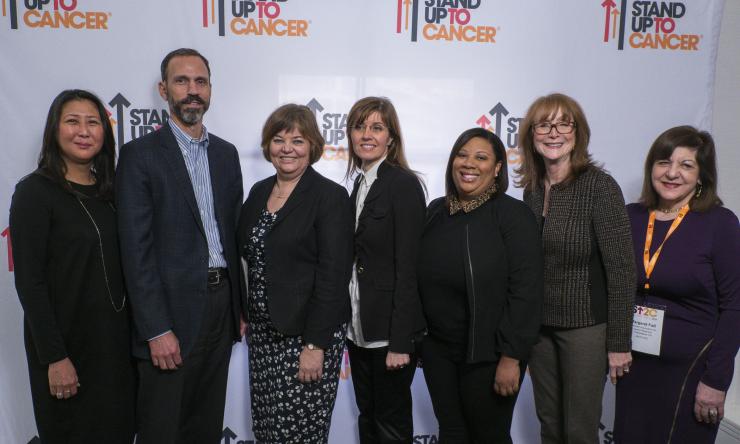Stand Up To Cancer Dream Team tackles T-cell lymphoma
Stand Up To Cancer (SU2C) announced yesterday at the annual SU2C Scientific Summit the creation of an $8 million Dream Team of top scientists, including Baylor College of Medicine’s Dr. Helen Heslop, focused on finding therapies for T-cell lymphoma, a rare cancer of the blood and immune system, using chimeric antigen receptors (CARs) to trigger the immune system to both attack and destroy cancerous cells.
The SU2C Meg Vosburg T-Cell Lymphoma Dream Team: Tailoring CAR-based Immunotherapy Strategies to T-cell Lymphoma will be headed by Heslop, Dan L Duncan Chair and director of the Center for Cell and Gene Therapy at Baylor, Houston Methodist Hospital and Texas Children's Hospital, with Dr. Gianpietro Dotti, from the University of North Carolina Chapel Hill as co-leader. The team honors the memory of Meg Vosburg, a lifelong learner, educator and humanitarian who died from T-cell lymphoma in 2018 at the age of 51.
Cancer immunotherapy, or enabling the body’s immune system to detect and destroy cancer cells, has had a tremendous impact on a wide range of cancers, including B-cell lymphomas. However, it has not yet been effective in lymphomas that involve T-cells, which make up less than 15 percent of non-Hodgkin lymphomas in the United States, according to the American Cancer Society. The biggest challenge is finding a therapy that can attack T-cells that are cancerous while leaving normal T-cells alone, since they are essential to the body’s immune response.
The Dream Team will test therapeutic approaches that utilize cells to carry molecules known as CARs against different antigens that are found on the surface of cancerous T-cells. Knowing the most effective combination of immune cell effectors and CARs will allow scientists to develop CAR-based therapeutics where the patient’s own immune system can expand into armies of cancer-fighting cells.
“We’re exploiting the potential of the immune system to cure T-cell lymphoma by genetically modifying immune system cells, called T-cells, so they have new receptors that will allow them to recognize the lymphoma cells and kill them,” said Heslop, who also is professor in the hematology-oncology section of the Departments of Medicine and Pediatrics at Baylor, and associate director for clinical research and leader of the Cancer Cell and Gene Therapy Program at Baylor's Dan L Duncan Comprehensive Cancer Center. “And we’re evaluating several different targets and sorts of immune effector cells. It’s a modular sort of system where we can hopefully combine the best from each approach to produce a therapy that will improve outcomes in this patient population."
In addition, the team is working to modify the CAR-carrying cells so they are not hindered by immune cells. This will help reduce the cancer and prepare patients for potential stem cell transplants to contain or cure the cancer.
CAR therapy is usually custom-built for each patient. The team is trying to find a way to develop CAR cells on an “off-the-shelf” basis so the therapy will be more available to patients and less expensive. The team also is working to identify biomarkers that will help track the effectiveness of the therapy and is evaluating a novel small molecule that shows encouraging activity in T-cell lymphoma as a cytoreductive (size-reducing) regimen.
“We are honored to receive this award and I am particularly pleased that our team includes so many young investigators,” Heslop added.
Other Baylor scientists on the team include Drs. Malcolm Brenner, Carlos Ramos, Maksim Mamonkin, LaQuisa Hill, Rayne Rouce and Natasha Lapteva, along with Bambi Grilley, who serves as an advocate on the project. For a full list of contributors from University of North Carolina-Chapel Hill, the University of Texas MD Anderson Cancer Center and Wake Forest Comprehensive Cancer Center, as well as advocates, visit the SU2C website.










